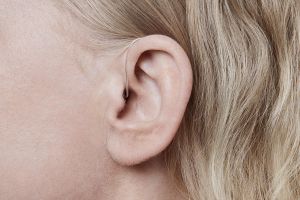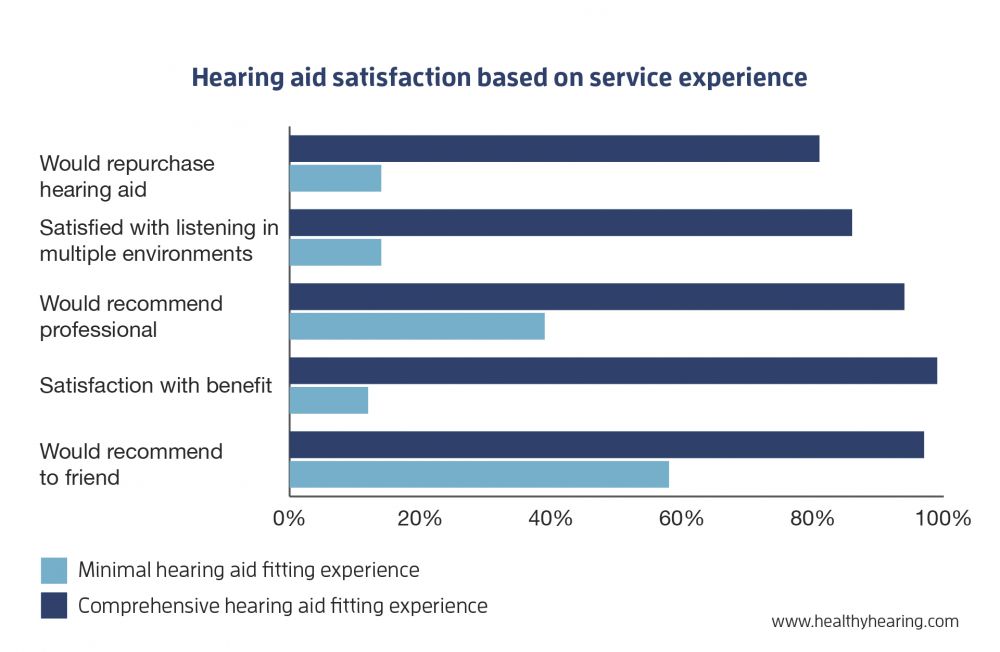There’s no way around it–hearing aid prices are high. They can range from just shy of $1,000 on up to more than $6,000 for each device, depending on the level of technology.
Most people with hearing loss need two hearing aids, and most insurance providers do not cover the cost. The high price tag is often a barrier to getting the help and relief hearing aids provide, but it doesn’t have to be. When it comes to cost, there’s a lot to consider.
Hearing aids are an important investment; these are devices you’ll be wearing most of your waking hours, seven days a week. When buying hearing aids, it’s essential to be sure the money and time spent is well worth it.
Table of Contents
What is included in hearing aid cost?
While hearing aid prices are high, it’s important to know that you are paying for far more than just the devices themselves.
Bundled vs. unbundled services
Your purchase typically includes the hearing test, consultation, initial fitting, and all follow-up adjustments, routine cleanings and a warranty that can range from one to three years. This is known as bundled pricing. The warranty often covers all repairs and includes a one-time replacement policy if you lose a hearing aid. Some hearing care professionals also include a supply of hearing aid batteries to get you started.

the technology has gotten far more
advanced.
Why is bundling so common? Your hearing ability may change, your hearing aid may need repair and you may have questions occasionally. You are making an investment in the professional as well as the hearing aid technology.
Still, some clinics may “unbundle” the hearing care costs from the cost of the hearing aids. In this pricing structure, you may be able to pick which services you want to purchase upfront, like a loss and damage warranty, and which you want to pay for as you go, like cleaning services for your hearing aids.
Either way, be sure to ask your hearing care professional what is included in the price of the hearing aids so you fully understand what you are purchasing.
Factors for hearing aid prices
The main factor that affects the purchase price of the hearing aid is the technology level and features included. As is true with most consumer electronics, technological sophistication gets less expensive over time, and this has certainly happened in the hearing aid business.
While the overall prices of hearing aids have remained steady, the technology you can get for the price is far greater currently than it was even just two years ago. What was once considered a top-of-the-line hearing aid is now considered basic technology.
All hearing aid manufacturers strive to offer devices that meet the needs of patients and their budgets. To do this, nearly every product line consists of multiple performance levels or price points. The most advanced level will contain all of the latest and greatest features like the most advanced noise reduction circuitry and wireless capabilities. Lower performance levels will contain fewer and less sophisticated features as the price decreases.
Why do hearing aids cost so much?
Hearing aid pricing includes the cost of the device itself as well as the services of the professional.
Some of the cost in manufacturing hearing aids is from the research needed to continue making technology advancements each year. Each year, hundreds of millions of dollars are spent by the industry to improve how these devices perform. These investments have led to hearing aids that serve people better.

final cost of hearing aids.
Here’s another way to think about the price of hearing aids. If your hearing aids cost $6,200, and they have a lifespan of eight years, they will cost you approximately $775 per year, $64 per month or $2.15 per day. In other words, while the total amount is high, the ongoing usage price is more reasonable. Monthly, it is about what you would pay to get satellite or cable television. When you consider the communication, relationship, and health benefits you get from wearing hearing aids, most people agree that it is well worth it.
Online and mail order hearing aids
You can purchase a lot of things cheaply online. If you have a mild hearing loss, you may be tempted to buy a personal sound amplification product (PSAP) from a website, often called “hearing amplifiers” or even “hearing aid amplifiers.” This product is similar to the eyeglass “cheaters” available at a corner drugstore. However, age-related hearing loss is more complex than age-related vision loss.
These cheaper products tend to boost all sounds, not just the ones you can’t hear. At a hearing clinic, your hearing aids are calibrated specifically to your unique hearing loss, and any other issues you may have, like tinnitus. Clinics also can pre-program your hearing aids to switch settings when you’re in different environments. And, if your services are bundled together, you can go back when you need to for refinement or cleanings.
A Better Hearing Institute study that surveyed 2,000 hearing aid users about their fitting experience and level of satisfaction revealed that your health care provider (usually an audiologist or a hearing instrument specialist) plays a big role in the patient’s success with hearing aids. (The study is no longer online.)
The outcome was straightforward: Those users who were fitted using a clinically validated hearing aid fitting protocol had greater satisfaction with their hearing aids. In other words, those patients who were given appropriate support and service by a licensed hearing aid professional actually heard better!
After buying hearing aids, a typical user will need about three follow-up visits for adjustments to get optimal sound quality. You will not be able to get that type of service through the mail.
Specifically, of those hearing aid users who received a comprehensive clinical protocol:
- 81 percent would repurchase the same brand of hearing aids.
- 85 percent were satisfied with how the hearing aids worked in multiple listening environments.
- 94 percent would recommend the professional they worked with to a friend.
- 99 percent were satisfied with the benefit they received from the hearing aids.
- 97 percent would recommend hearing aids to a friend.
Alternatively, when an incomplete fitting and adjustment method is used, such as what might be offered to those who order hearing aids from the internet:
- 14 percent would repurchase the same brand of hearing aids.
- 14 percent were satisfied with how the hearing aids worked in multiple listening environments.
- 39 percent would recommend the professional they worked with to a friend.
- 12 percent were satisfied with the benefit they received from the hearing aids.
- 56 percent would recommend hearing aids to a friend.

hearing-healthcare-professional-on-hearing-aid-user-success
Should I buy hearing aids online?
Financial assistance and insurance coverage
The most recent data have shown that about 40 percent of Americans have some form of third-party payment that helps to pay for hearing aids. Check with your insurance provider to see if you have a benefit and if so, the amount of that benefit. Most plans that include hearing aids cover only a certain amount of the aids (on average about 85 percent of the cost) every few years.
If you have a served in the US military, you might be eligible for hearing aids through the Department of Veteran’s Affairs (VA). When you qualify, the VA normally pays for everything associated with the hearing aid, including a supply of batteries. There are other options for hearing aid funding, including low-interest loans, credit cards and same-as-cash financing plans for medical devices.
Review Healthy Hearing’s information on hearing aid insurance, Medicare, AARP and the Veteran’s Affairs for more information. Then, talk with your hearing care provider about your options for financing and coverage. There may be local charities or sources of financing that will apply to your situation.
Why should I buy hearing aids?
When deciding whether or not to spend your hard-earned money on hearing aids, consider too the financial impact of not spending that money on hearing aids. It is nearly impossible to put a price on the missed conversations with your spouse, family, friends and colleagues.
It is nearly impossible to put a price on the missed conversations with your spouse, family, friends, and colleagues.
Also missing if you have hearing loss are some of the beautiful and important sounds of life: The laughter of your grandchildren, cheerful bird songs, raindrops falling softly outside your window, your doorbell, the car’s turn signal and the timer on your oven.
If you are still working, you are also losing money due to your hearing loss. A study by the Better Hearing Institute looked at more than 40,000 households and found that untreated hearing loss reduced income on average by $12,000 per year and on the high end, up to $30,000 a year. The good news is that wearing hearing aids can mitigate the effects of that by 50%. That’s a good return on your investment.
Finally, hearing aids are good for your health. Untreated hearing loss is linked to other health conditions such as dementia, depression, high blood pressure and increased risk of trips and falls.
Buying hearing aids is an important investment in your quality of life, working career, relationships and overall health. The right hearing care professional will understand your hearing loss as well as your financial situation. Don’t put off this important step in your quality of life. Check out our directory to find hearing aid centers near you and make the call today.

